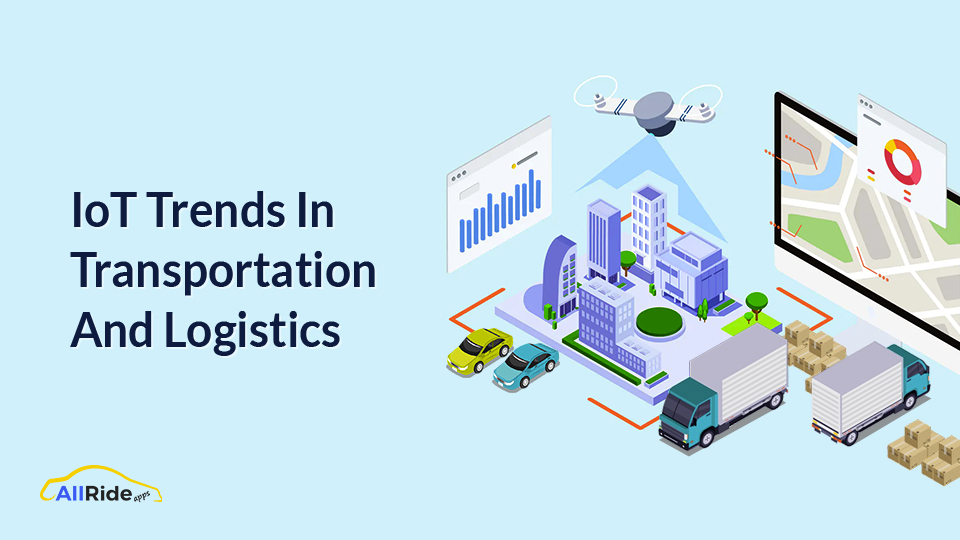
IoT In Transportation And Logistics- Major Trends Of 2020
In the 21st century, there has been a huge buzz about the Internet of Things (IoT). IoT now has touched every little aspect of our life that we just cannot ignore. Technology has worked beyond our expectations. Connectivity, convenience, efficiency are some of the perks of IoT which has made us rely on this technology even more. This blog entails the influence of IoT in transportation and logistics and also the major trends of the year 2020.
With digitalization at its peak, the world has been making complete utilization of IoT and this is something that cannot be denied. Every other industry today relies upon the Internet of Things technology as it is making their task simpler and easier to handle. Let’s see how IoT in transportation and logistics is going to revolutionize our economy in 2020.
Is IoT Shaping Our Future?
IoT has opened doors for various business opportunities and has helped us in making better business decisions. The innovations that are IoT-driven are helping to build strong business cases and also boosting the increase in ROI (Return On Investments). This technology has in fact got the potential to convert the way businesses are approaching the world thus leveraging the scope of IoT beyond connectivity.
Related read: Want To Boost Your Logistics ROI? Here’s 3 Awesome Strategies For Your Business?
Being connected with several devices to the internet, IoT has even allowed the businesses to get smarter by providing them the real-time operational or functional insights while eliminating the operational costs. It has even helped in improvising labor efficiency and eliminating the issue of downtime. Apart from these, the benefits of IoT are immense.
How IoT Has Changed The Transportation Game?
Transportation and logistics is an integral part of transportation businesses and also the backbone of any economy. These facts clearly signify new opportunities that the transportation market is expecting in the near future. The transportation industry is currently experiencing a broader series of services, entry of new market players, expanding customer experience, a new business model with the introduction of machine learning, AI and other new-age tech innovations.
Although the transportation industry has been facing hubbub for so many years now, the development of Warehouse Management Systems (WMS), startups and the internet are upscaling the transportation business now. The transportation-based startups are increasing their revenue flow every year by aggregating with IoT-related technical advancements.
The major factor that drives the game-changing value of the transportation industry is IoT. Apart from being an important part of the infrastructural department, the transportation sector takes a huge share of any nation’s GDP for revenue generation, investment, and employment generation. The transportation sector has seen major developmental changes with the advent of IoT in both the private and public sectors.
It has been more than two decades since the transportation and logistics companies are using networks and sensors to extract information. These systems were not connected to IT. Thanks to the advent of IoT, which has enabled the cloud storage process through which the storage and processing of a huge data volume have been possible.
Related read: Transportation and Logistics Mobile Apps NEED These 4 Features
With the passage of time, transportation startups started relying on connected devices to accomplish their day-to-day tasks. Reduction in the size and cost of the sensors, memory chips, microprocessors, and other communication systems have actually boosted the adoption of connected devices in most of the transport and logistics startups.
Currently, the maximum number of investments that are made in the transport sector is either for constructing new infrastructure or to develop an existing network. Right from time and speed, to risk and safety mitigation, the transportation sector has implemented the best of all technological advances to access the larger areas.
Major IoT Trends Of Transportation Industry In The Year 2020
At present, various business models are influencing the growth of the transportation industry. As the newer megatrends are coming up, the industry is reshaping itself with all those trends. Not only this but the emergence of the key market players, like new ventures and startups, are actually providing the momentum for expanding the industry. Let us check some of the major trends of the IoT in the transportation and logistics sector:
1. Boost In Transportation Network
The rise in urbanization has led to the rise in megacities which means the doubling up of the global population every year. This has led to the development of the transportation industry with a higher demand for better and faster modes of transportation, newer roads and enhanced connected transportation networks. Rising complexities in transportation in most of the developing economies have now become a bigger challenge for the government to solve.
Thanks to the advent of the IoT in transportation and logistics industry which has made these complexities simpler. It has made the connected networks even more feasible in almost every functioning business sector today. The integration of smart transportation systems has successfully resolved most of the complexities and issues that were causing a hindrance to the development of the transportation industry.
2. Detailed Tracking Will Help Enhancing Customer Experience
Business is all about getting the right product at the right place and time to the right set of customers. IoT has made this process even easier. Instead of barcode scans, people are making use of the sensors for tracking assets that are in transit. This is also economically feasible as customers are getting detailed updates of their assets and by when can they expect delivery.
3. Newer Fleet Management Solutions
As technology is getting readily accessible every passing day, companies are improving processes and maximizing their efficiencies. From telematics and GPS to expenses and maintenance, technology offers solutions to several other common problems that fleet managers face every day.
Newer fleet management solutions like the enhancing capabilities of Autonomous Vehicle technology has led to better customer satisfaction. Even with semi-autonomous vehicles, operators would have better opportunities for task completion, as well as better communication systems with managers and customers.
Related read: Real World Impact Of Internet Of Things Mobile Applications In 2020 + INFOGRAPHIC
4. Easier Reporting And Regulatory Compliance
In many countries, drivers are required to record their activities, retain their old records, and produce them to the transportation department whenever required. The digital tachographs that record distance, speed, and driver’s activity ensure the regulatory compliance and exact record-keeping for the entire fleet. Digital tachographs are now integrated for better transportation networking.
5. Vehicle-To-Vehicle Communication
With smartphones getting even smarter, vehicles can now easily communicate in real-time. This allows the vehicles to drive in sections, that helps them to maintain speed and distance automatically between one another. This technique, not only frees the space on the road for the other vehicles to ply, it even helps in producing lesser air drag, which leads to lower fuel emissions and consumption.
6. Data Ownership Will Enable A Better Ecosystem
With unclear potential outcomes, end-user data is an important asset. Discovering opportunities to utilize that information viably could prompt coordinated efforts with both disruptors and set up players in the transportation and logistics ecosystem.
Today, IoT solution providers typically are the key arrangement suppliers for commercial vehicle data, however, open interfaces are giving fleet administrators more control. The capacity to gather information from other fleet networks will enable the fleet managers to accept a prominent role, working in association with OEMs who can just gather information from the vehicles they fabricate.
More About The Smart Transportation Market
Smart transportation IoT solutions are now integrated with smart city solutions, which has enabled various government organizations and their associated partners in creating a safer and efficient transport infrastructural facilities. IoT in transportation and logistics, offer one with accurate data and real-time visibility, thus allowing the city transport authorities in improving efficiency while creating greener and smarter cities.
As per a recent report by Mordor Intelligence, the global smart transportation market is anticipated to reach the valuation of USD 262.1 billion by the end of the year 2025, by growing at a CAGR of 18.68% during the forecast period. The advancements made in cloud-based technologies like enhancements of vehicle-to-grid infrastructure (V2I) and vehicle-to-vehicle (V2V) are making smart transportation even smarter.
Government initiatives taken in the improvement of the transportation industry and the growing concerns about road mishaps and automobile thefts are one of the major driving factors that are augmenting the smart transportation market. In the upcoming days, the major automotive manufacturers would be seen utilizing the best safety devices and other factory-fitted telematics in most of the high-end vehicles.
The competition amongst major industry players is somewhat competitive as compared to other industries where IoT has made a huge impact. The major industry players are now currently focusing on growing their customer base in various ‘developed’ and ‘developing’ economies, while the government of those regions is focusing on improvising their nation’s transportation infrastructures.
In A Nutshell
The Internet of Things (IoT) surrounding the transport and logistics industry is gradually growing in size and also getting more sophisticated with time. Trends will keep on changing and the industry will keep upgrading itself with the ongoing trend. These advancements in the industry will bring in a huge difference in the lives of common people. With the latest technologies, IoT devices will become even more intuitive and convenient to utilize.
The future of the transportation industry is actually promising amidst all the IoT trends and predictions for the year 2020. Is your business ready for the much-needed IoT digital transformation? Our experts are here to guide you with the best possible ways to deploy successful IoT-based solutions.






